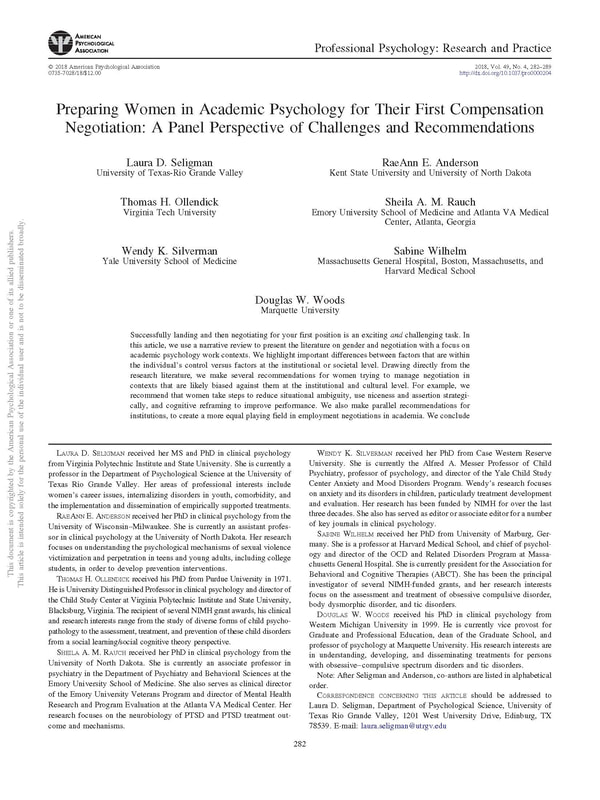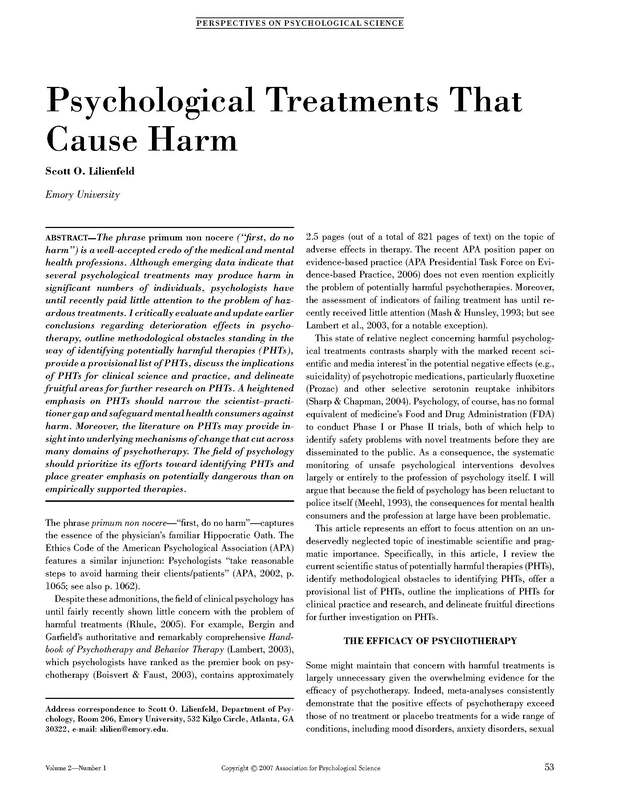Below, Dr. Hovey shares both important public health information and some of his favorite things in Psychology. Feel free to contact Dr. Hovey if you have questions about--or would like to discuss--any of the below.
What is Anxiety & How Common is It?Experiencing some anxiety can be adaptive as an optimal amount of anxiety can motivate us and help us to function. Too much anxiety, however, can be crippling and can lead to an anxiety disorder. Anxiety disorders are very common in children and adults and, as a group, are the most common psychological disorder. In fact, up to 1/3 of us will experience an anxiety disorder at some point in our lives (Kessler et al., 2012). Although anxiety disorders can be painful and disabling and are often linked with other disorders, such as depression and substance abuse, the good news is we have some very effective treatments for anxiety
For a description of the most common anxiety, stress, and obsessive-compulsive disorders, please click here. For information about effective treatments for anxiety, please click here. |
Resources for Young Professionals
|
Preparing for job interviews and and then negotiating after you receive a job offer can be very daunting. Recently, Laura D. Seligman, Ph.D., ABPP, Professor in the Psychological Science Department at The University of Texas Rio Grande Valley, wrote an excellent paper on preparing women for negotiations in academic settings. In this article, Dr. Seligman and colleagues review the scientific literature on gender and negotiation and offer important recommendations for successful negotiating at both the individual and institutional levels. Although the article was published in 2018, it has already become required reading for many young professionals. For a copy of the article, please click here.
|
Treatments that Work & Treatments that Harm
|
Although the field of clinical psychology has increasingly emphasized the importance of rigorously assessing the effectiveness of psychological treatments so that we can identify and offer treatments that work, little emphasis has been given to the opposite: scientifically evaluating the potential harmful effects of treatment. Scott Lilienfeld from Emory University is one of the few researchers who has studied the harmful effects of treatment and he has written some very thought-provoking papers on the topic. Please click here for a copy of his 2007 paper in Perspectives on Psychological Science in which he identifies psychological treatments that appear to cause harm to individuals. You may be surprised by some of the treatments he identifies!
|
The Relevance of Milgram
|
Many of us are familiar with Stanley Milgram's experiment on obedience, arguably the most famous experiment in the history of psychology. We may have learned about Milgram's work either in a psychology class or in popular culture. When learning about Milgram's research, people's first reactions are often, "How terrible it must have been for the participants," or "Because the participants were under duress, the experiment was unethical." What we learned from Milgram's experiment, however, is invaluable as it helps us to understand how many people appear to blindly follow others and do what they're told without taking personal responsibility for their actions. Given today's sociopolitical climate, Milgram's findings are as relevant as ever.
|
|
Tele-CBT as a Viable Treatment Option for Anxiety & Depression
|
Although various forms of Cognitive-Behavioral Therapy (CBT) are effective against depression and anxiety disorders, CBT is often not available for rural and underserved populations due to its lack of dissemination and implementation and/or the lack of mental health providers. In the Rio Grande Valley in south Texas where Dr. Hovey lives and works, for example, there are zero licensed psychologists in two out of its four counties. Thus, in traditionally underserved areas such as these, the implementation of Tele-CBT--in which CBT is delivered through video means--should be strongly considered. Benefits of Tele-CBT include improved access to services; reductions in barriers such as transportation, scheduling, physical health, and child-care difficulties; and reductions in stigma and privacy concerns. Although scant published research has examined Tele-CBT, these findings indicate that it is as effective as in-person CBT in combating childhood depression (Nelson et al., 2003), childhood obsessive-compulsive disorder (Comer et al., 2017), panic disorder with agoraphobia (Bouchard et al., 2004) in adults, and depression (Acierno et al., 2016) and post-traumatic stress disorder (Yuen et al., 2015) in veterans. Jones and colleagues (2014) provide guidelines for establishing telemental health programs. This article is highly recommended as the authors discuss challenges in setting up telemental health as well as the modification of services for its proper delivery. For a copy of this article, please click here.
|
Websites of Interest
Professional Organizations
American Academy of Child & Adolescent Psychiatry
American Foundation for Suicide Prevention
Anxiety Disorder Association of American
Association for Behavioral & Cognitive Therapies
Association for Psychological Science
Beck Institute for Cognitive Behavior Therapy
Anxiety & Depressive Disorders
Anxiety Disorders & Treatment
Calm Clinic for Anxiety & Panic
Dental Anxiety
Health Anxiety
Selective Mutism
Social Anxiety Support Forum
Stress & Anxiety Reduction
Bipolar Disorder & Treatment
Major Depression
Depression Screen
Depressive Disorders & Treatment
Overcoming Low Self-Esteem & Depression
Managing Anxiety Related to Coronavirus
Resources for Mental Health & COVID-19
Cognitive Behavioral Therapy Information
Association for Behavioral & Cognitive Therapies
National Association of Cognitive Behavioral Therapists
PsychCentral
American Academy of Child & Adolescent Psychiatry
American Foundation for Suicide Prevention
Anxiety Disorder Association of American
Association for Behavioral & Cognitive Therapies
Association for Psychological Science
Beck Institute for Cognitive Behavior Therapy
Anxiety & Depressive Disorders
Anxiety Disorders & Treatment
Calm Clinic for Anxiety & Panic
Dental Anxiety
Health Anxiety
Selective Mutism
Social Anxiety Support Forum
Stress & Anxiety Reduction
Bipolar Disorder & Treatment
Major Depression
Depression Screen
Depressive Disorders & Treatment
Overcoming Low Self-Esteem & Depression
Managing Anxiety Related to Coronavirus
Resources for Mental Health & COVID-19
Cognitive Behavioral Therapy Information
Association for Behavioral & Cognitive Therapies
National Association of Cognitive Behavioral Therapists
PsychCentral
Crisis Resources
If you are in crisis and you are thinking about hurting yourself, please reach out to a family member or friend. For free immediate support, you can also call one of the below hotlines or chat on the online network.
Suicide & Crisis Lifeline: Dial 988 from your phone
National Hopeline Network: 1-800-442-HOPE (1-800-442-4673)
Vet2Vet Veterans Crisis Hotline: 1-877-VET2VET (1-877-838-2838)
Spanish Speaking Suicide Hotline: 1-800-SUICIDA (1-800-784-2432)
Teen to Teen Peer Counseling Hotline: 1-877-YOUTHLINE (1-877-968-8454)
Post-Partum Depression Hotline: 1-800-PPDMOMS (1-800-773-6667)
Crisis Text Line: Text HOME to 741741 - Get help through texting
IMAlive: Online Network for Crisis Intervention - Get help through online chat
Suicide & Crisis Lifeline: Dial 988 from your phone
National Hopeline Network: 1-800-442-HOPE (1-800-442-4673)
Vet2Vet Veterans Crisis Hotline: 1-877-VET2VET (1-877-838-2838)
Spanish Speaking Suicide Hotline: 1-800-SUICIDA (1-800-784-2432)
Teen to Teen Peer Counseling Hotline: 1-877-YOUTHLINE (1-877-968-8454)
Post-Partum Depression Hotline: 1-800-PPDMOMS (1-800-773-6667)
Crisis Text Line: Text HOME to 741741 - Get help through texting
IMAlive: Online Network for Crisis Intervention - Get help through online chat



